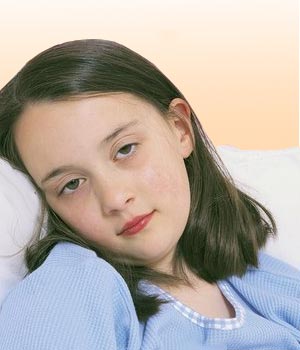Attention Deficit Hyperactivity Disorder - ADHD

7 year old John can't sit still in his seat and drives everyone crazy at home and school. He cannot still for long enough to get his homework or chores done. John is a typical case of attention deficit hyperactivity disorder - ADHD where there is inappropriate level of concentration, attention and distractibility. Since the 1990s, the number of cases of ADHD in the US has increased drastically - from 950,000 in 1990 to 2.4 million in 1996. We bring you examples of attention deficit disorder children and try to understand this syndrome.
ADHD - Attention deficit hyperactivity disorder is indicated by hyperactive behavior and difficulty in concentration. While some kids display only signs of inattention, others are hyperactive and inattentive. ADHD kids are always fidgety and restless and cannot sit still for long. They interrupt others and are always restless and running about.
It is estimated that about 3-5% of school-going children suffer from attention deficit hyperactivity disorder. It may persist into adulthood in approximately 10% to 50% of individuals. The actual cause for ADHD is not known though one of the theories is that some people do not have enough neurotransmitters that can control behavior. Often ADHD is genetic. Boys are three times more likely than girls to have ADHD.
- Constant restlessness
- Talking and playing too loudly
- Interrupting others
- Difficulty in following instructions
- Distracted and forgetful
- Disorganized and inability to pay attention to details.
- Running around at the wrong place or time.
- Difficulty sustaining attention in tasks or play activities.
- Not following through on instructions and failing to finish schoolwork.
Diagnosing attention deficit hyperactive disorder is essential to help understand the problem. The diagnosis of ADHD is a collaborative effort between teachers, parents and physicians. It could include medical evaluation along with assessment of cognitive ability and IQ and review of school performance.
Speech and language evaluation is also conducted. ADHD is often accompanied by some other behavioral or emotional problem. Children with ADHD tend to experience adverse effects in academic and social and emotional development. The ADHD child may squirm, fidget, and climb or run when it is not appropriate. The levels of inattention and hyperactivity compromise the child's daily functioning.
ADHD treatment
Such a child is usually allowed to learn along with peers but special attention needs to be paid to his unique needs. A teacher may need to give him extra time to complete assignments and may need to seat him in an area with few distractions.
A child suffering from ADHD needs support in monitoring and controlling his behavior and attention levels. He needs to be supported with good teaching methods that help focus and remember. Treatment for ADHD includes behavioral therapy and medication. This would involve the family and school.
Parents and teachers would need to learn strategies to modifying the child's behavior and reward him appropriately. This includes problem solving, open and effective communication skills, anger management or conflict resolution. The child needs to be taught social skills and behaviors. Medication for ADHD is restricted to amphetamine-like stimulants such as Ritalin and Dexedrine.
They reduce hyperactivity among children and help them focus their attention. Behavioral improvements such as lesser aggression and forgetfulness are also noticed. But the side effects of this Class A drug are insomnia, loss of appetite and weight loss. The child may experience sadness, depression and sleepiness.
Top of the Page: Attention Deficit Hyperactivity Disorder - ADHD
Tags:#attention deficit hyperactivity disorder #ADHD
 Parenting
Parenting Stages of Growth
Precocious Puberty
Nutrition for Kids
Developmental Milestone
Empty Nest Syndrome
Infants
Sudden Infant Death Syndrome
Infant Gas Drops
Milk Allergy in Infants
Infant Reflux
Infant Nutrition
Infant Bathing
Infant Toy
Infant Colic
RSV in Infants
Asthma in Infants
Infant Brain Development
Babies
Baby Milestone
Baby Teething
Toddler Food Recipe
Baby Nursery Furniture
Baby Food Tip
Baby Monitor
Baby Burping
Children Care
 Regular Bedtime for Toddlers
Regular Bedtime for Toddlers Child Care
Kid Summer Camp
Kid Gym
Tween Parenting
Benefits of Breastfeeding
Oppositional Defiance Disorder
Attention Deficit Hyperactivity Disorder - ADHD
Kid Homework Help
Fine Motor Skill
Family Parenting
Single Parenting
Specialty Toy
Child Playhouse
Playgroup
Causes of Child Obesity
Autistic Child
Learning Disability
Toddler Activity
Activities for Toddlers
Child Safety Tip
Child Safety on the Net
Allergies in Toddlers
Top of the Page: Attention Deficit Hyperactivity Disorder - ADHD
Popularity Index: 100,947

